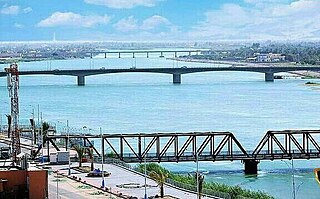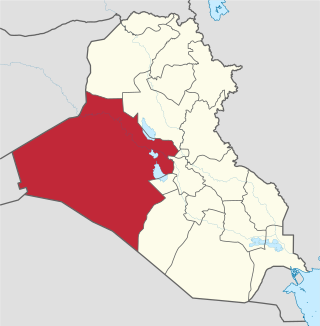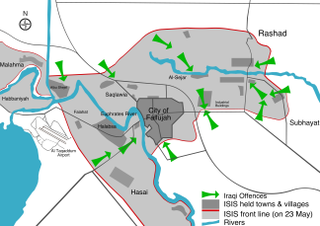Related Research Articles

Fallujah is a city in Al Anbar Governorate, Iraq. Situated on the Euphrates River, it is located roughly 69 kilometres (43 mi) to the west of the capital city of Baghdad. The city dates back to the Babylonian era and was host to important Jewish academies for many centuries.

Al Anbar Governorate, or Anbar Province, is the largest governorate in Iraq by area. Encompassing much of the country's western territory, it shares borders with Syria, Jordan, and Saudi Arabia. The population is mostly Sunni Muslims. The provincial capital is Ramadi; other important cities include Fallujah, Al-Qa'im and Haditha.
Operation Plymouth Rock was a major anti-insurgent sweep of an area south of Baghdad launched on 23 November 2004. Iraqi, American and British troops took part. Elements of the American 24th Marine Expeditionary Unit and the British Black Watch Regiment took part.

The 3rd Marine Division is a division of the United States Marine Corps based at Camp Courtney, Marine Corps Base Camp Smedley D. Butler in Okinawa, Japan. It is one of three active duty infantry divisions in the Marine Corps and together with the 1st Marine Aircraft Wing (1stMAW) and the 3rd Marine Logistics Group forms the III Marine Expeditionary Force. The division was first formed during World War II and saw four years of continuous combat in the Vietnam War. Today, elements of the 3rd Marine Division are continuously forward deployed and forward postured to carry out the US Government's mission of a Free and Open Indo-Pacific in conjunction with its sister services.

1st Battalion, 25th Marines (1/25) is a reserve infantry battalion in the United States Marine Corps located throughout New England and upstate New York and consisting of approximately 850 Marines and Sailors. The battalion falls under the 25th Marine Regiment in the 4th Marine Division.

3rd Battalion, 24th Marines (3/24) was a reserve infantry battalion in the United States Marine Corps. The battalion was first formed in 1943 for service in the Pacific Theater of Operations during World War II, taking part in a number of significant battles including those at Saipan and Iwo Jima before being deactivated at the end of the war. In the early 1960s, the unit was reactivated as a reserve battalion. It was located throughout the Midwestern United States and consisted of approximately 800 Marines and Sailors. The battalion was part of the 24th Marine Regiment and the 4th Marine Division. Recent operations included tours in Iraq and Afghanistan. On May 19, 2013, the battalion was deactivated (retired) as a part of 2013 Marine Corps Force Restructuring, along with the 24th Marine Regiment. 3/24 personnel were reallocated to 23rd Marine Regiment, with the majority of the companies becoming 3rd Battalion, 23rd Marines.
Battleplan is a 2006 military television documentary series examining various military strategies used in modern warfare since World War I. It is shown on the Military Channel in the U.S. and Yesterday. Each episode looks at particular military strategy – or "battleplan" – through two well-known historical examples, gauging them against the ideal requirements necessary to successfully conduct that strategy. All the episodes use examples from modern warfare, dating from the First World War (1914–18) up to the Iraq War (2003). Lloyd Clark and Bruce Gudmundsson analyze the information and talk about it on the show.

The 2004 Iraq spring fighting was a series of operational offensives and various major engagements during the Iraq War. It was a turning point in the war; the Spring Fighting marked the entrance into the conflict of militias and religiously based militant Iraqi groups, such as the Shi'a Mahdi Army.

Kuma Games is an American video game developer, specializing in developing free episodic and first-person shooters (FPS) since 2004. The company has also created a number of machinima movies for their games, particularly The Dinohunters.

Operation Phantom Thunder began on 16 June 2007, when Multi-National Force-Iraq launched major offensive operations against al-Qaeda and other extremist terrorists operating throughout Iraq. Operation Phantom Thunder was a corps level operation, including Operation Arrowhead Ripper in Diyala Province, Operation Marne Torch and Operation Commando Eagle in Babil Province, Operation Fardh al-Qanoon in Baghdad, Operation Alljah in Anbar Province, and continuing special forces actions against the Mahdi Army in southern Iraq and against Al-Qaeda leadership throughout the country. The operation was one of the biggest military operations in Iraq since the U.S. invasion in 2003.

The Anbar campaign consisted of fighting between the United States military, together with Iraqi security forces, and Sunni insurgents in the western Iraqi governorate of Al Anbar. The Iraq War lasted from 2003 to 2011, but the majority of the fighting and counterinsurgency campaign in Anbar took place between April 2004 and September 2007. Although the fighting initially featured heavy urban warfare primarily between insurgents and U.S. Marines, insurgents in later years focused on ambushing the American and Iraqi security forces with improvised explosive devices (IEDs), large scale attacks on combat outposts, and car bombings. Almost 9,000 Iraqis and 1,335 Americans were killed in the campaign, many in the Euphrates River Valley and the Sunni Triangle around the cities of Fallujah and Ramadi.
Robert Lee Sherrod was an American journalist, editor and writer. He was a war correspondent for Time and Life magazines, covering combat from World War II to the Vietnam War. During World War II, embedded with the United States Marine Corps, he covered the battles at Attu, Tarawa, Saipan, Iwo Jima, and Okinawa. He also authored five books on World War II, including Tarawa: The Story of a Battle (1944) and the definitive History of Marine Corps Aviation in World War II (1952). He was an editor of Time during World War II and later editor of The Saturday Evening Post, then vice-president of Curtis Publishing Company.

The 2012–2013 Iraqi protests started on 21 December 2012 following a raid on the home of Sunni Finance Minister Rafi al-Issawi and the arrest of 10 of his bodyguards. Beginning in Fallujah, the protests afterwards spread throughout Sunni Arab parts of Iraq. The protests centered on the issue of the alleged sectarianism of Prime Minister Nouri al-Maliki. Pro-Maliki protests also took place throughout central and southern Iraq, where there is a Shia Arab majority. In April 2013, sectarian violence escalated after the 2013 Hawija clashes. The protests continued throughout 2013, and in December Maliki used security forces to forcefully close down the main protest camp in Ramadi, leaving at least ten gunmen and three policemen dead in the process.

Beginning in December 2012, Sunnis in Iraq protested against the Maliki government. On 28 December 2013, a Sunni MP named Ahmed al-Alwani was arrested in a raid on his home in Ramadi. Alwani was a prominent supporter of the anti-government protests. This incident led to violence in Al Anbar Governorate between the Iraqi Army and a loose alliance of tribal militias and other groups fighting alongside the Islamic State of Iraq and the Levant (ISIL).

The Al-Karmah offensive, codenamed Fajr al-Karma, was an offensive launched by the Iraqi Army and anti-ISIL Sunni tribal fighters to recapture the Al-Karmah district taken by the Islamic State of Iraq and the Levant in Iraq. The offensive began on 14 April 2015. During the offensive the anti-ISIL forces captured part of the city of Al-Karmah, and the old road of Al-Karmah.

The Anbar campaign (2015–2016) was a military campaign launched by the Iraqi Armed Forces and their allies aimed at recapturing areas of the Anbar Governorate held by the Islamic State of Iraq and the Levant (ISIL), including the city of Ramadi, which ISIL seized earlier in 2015. The United States and other nations aided Iraq with airstrikes.

The siege of Fallujah was an offensive launched in February 2016 by the Iraqi government against the Islamic State of Iraq and the Levant (ISIL) in al-Karmah and in the city of Fallujah, with the aim of enforcing a siege of the latter. During the early stages of the operation, local Sunni residents revolted against ISIL for a period of three days. On 22 May, after completing preparations around the city, the Iraqi Army and supporting Shi'ite militias launched the third Battle of Fallujah.
This is a timeline of events during the War in Iraq in 2016.

The Battle ofAr-Rutbah was a military offensive in Iraq launched by the Iraqi Army to recapture the strategic town of Ar-Rutbah from ISIL, along with the rest of the Ar-Rutba District.
The Western Anbar offensive (2017) was a military operation by the Iraqi Army against the Islamic State of Iraq and the Levant, in the western districts of the Province of Anbar and on the border with Syria.
References
- ↑ "History Channel and Kuma Announce Shootout". Game Industry News. 22 December 2006. Retrieved 5 December 2023.
- ↑ "Kuma Games and the History Channel Present: Shootout!: Tet Offensive". GameZone. 6 December 2006. Retrieved 5 December 2023.